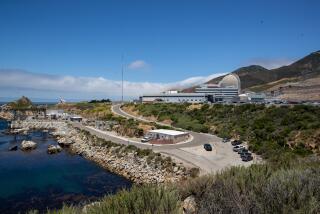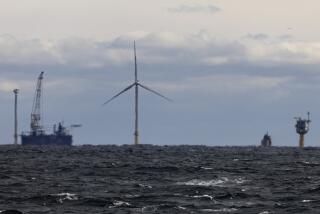First new U.S. nuclear reactors in decades approved
A consortium of utilities in the South won government approval Thursday to construct two new atomic energy reactors at an estimated cost of $14 billion, the strongest signal yet that the three-decade hiatus of nuclear plant construction is finally ending.
Several new projects will test whether new technology and streamlined government licensing can help the industry avoid the economic and safety disasters that have tainted its past, nuclear experts say, though critics condemned the action by the Nuclear Regulatory Commission.
The commission’s 4-1 approval of the construction and operating license to expand the capacity of a Georgia nuclear power plant came 11 months after the meltdown at Japan’s Fukushima Daiichi facility left a wide swath of radioactive contamination.
Despite broad international concern that the safety risks of nuclear power are unacceptable even after half a century of widespread use, proponents have argued successfully that a new generation of reactors and strong U.S. regulations justify making it part of the mix to meet the nation’s energy needs.
The project at Plant Vogtle near Waynesboro, Ga., is being undertaken by Southern Co., which operates four electric utilities in the South, and three minority partners — all aided by a massive federal loan guarantee and other incentives.
“It is something we believe is a national imperative,” said Southern Chief Executive Thomas Fanning, who described his company’s strategy of investing in coal, nuclear, gas and renewable fuels as consistent with the broad outlines of Obama administration goals. “It is a big day in America.”
Fanning said $4 billion had already been invested in site preparation at Plant Vogtle based on an expectation that the NRC would approve construction to double the number of reactors at the site. The company has ordered twin 1,100-megawatt reactors, known as AP1000s, built by Westinghouse Electric Co.
It may take several years before it becomes clear whether the license approval represents a rebirth of an industry. Westinghouse officials said they expected another license approval for their reactors in coming weeks and noted that there were about 20 in various stages of planning, 14 of which would use the company’s advanced new design. They said the vast majority of the work would be done in the U.S., supporting 35,000 workers at the company and its suppliers. The new reactors would mainly be located in the South.
Not all of those projects are likely to move through licensing, experts say, and there have been repeated claims over the last decade that the U.S. nuclear power industry was on the brink of a renaissance. In fact, the industry is likely to move cautiously forward, if only for economic rather than safety reasons.
The heyday of nuclear plant construction almost bankrupted the electric utility industry and saddled ratepayers with high bills for decades. The last new nuclear construction license was issued 34 years ago, predating general use of personal computers and widespread recognition of global warming. Throughout the prior two decades, the industry had bet big on nuclear power and then suffered a combination of legal, political and economic knockout punches.
By 1985, 28 nuclear plants under construction were canceled, according to Sam Walker, the regulatory commission’s historian. The Shoreham plant on Long Island in New York completed construction but never generated a single watt of commercial electricity.
Former NRC member Peter Bradford, now a law professor in Vermont, said Thursday’s approval did not change the poor economics of nuclear power. What makes a difference in Georgia is that the state has ruled that customers are going to have to pay, he said.
The reactor is supposed to have all of the technology and safeguards to avoid a meltdown like the one that occurred at Fukushima, which was hit by a tsunami after a massive earthquake and lost electrical power to keep its reactor cool. The Westinghouse system is supposed to be able to endure a complete blackout and safely shut down the reactor with passive cooling systems, said company spokesman Vaughn Gilbert.
Nonetheless, the NRC vote reflected continued concerns about nuclear safety. Commission Chairman Gregory B. Jaczko, who cast the lone vote against approval, said in an interview that he was not satisfied that the license would compel Southern Co. to adopt safety improvements that result from the ongoing review of the Fukushima accident. Jaczko said it would be “very difficult” to get Southern’s compliance after the license was issued.
Christopher Paine, a nuclear expert at the Natural Resources Defense Council, said the NRC had “abdicated its responsibility” and given up the power to force Southern to adopt new safeguards that are developed as the Fukushima review unfolds.
But Fanning, the Southern chief executive, said the company did not intend to fight future NRC orders to adopt new safety technology. “That’s not how this industry operates,” he said.
Vartabedian reported from Los Angeles and Duncan from Washington.
More to Read
Start your day right
Sign up for Essential California for news, features and recommendations from the L.A. Times and beyond in your inbox six days a week.
You may occasionally receive promotional content from the Los Angeles Times.







